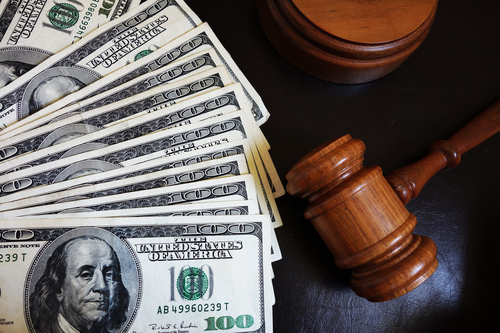“Judge Selna’s ruling on sanctions noted that there is no evidence that the 2020 amendment existed other than statements by ConsumerDirect’s CEO.”
 On November 8, a Central California jury entered a verdict awarding $3.9 million in punitive damages against Internet financial platform ConsumerDirect. The verdict comes weeks after U.S. District Judge James Selna granted a motion for sanctions after finding that ConsumerDirect fraudulently represented its ownership of unregistered trademarks while obtaining a preliminary injunction in U.S. district court against Array.
On November 8, a Central California jury entered a verdict awarding $3.9 million in punitive damages against Internet financial platform ConsumerDirect. The verdict comes weeks after U.S. District Judge James Selna granted a motion for sanctions after finding that ConsumerDirect fraudulently represented its ownership of unregistered trademarks while obtaining a preliminary injunction in U.S. district court against Array.
ConsumerDirect Obtains Injunctive Relief on Trademarks Owned By Non-Party
ConsumerDirect sued Array in 2021, asserting ownership of the unregistered marks IDLOCK.COM and CREDITMONITORING.COM, along with the associated domain names. ConsumerDirect represented to the court that it had exclusive use of the marks dating back to 2015, relying on a declaration by its CEO in support of that allegation. In March 2022, the district court enjoined Array from using any of the asserted marks. ConsumerDirect voluntarily dismissed its trademark claims last November after settling with Array and other defendants.
Although Array was unsuccessful in appealing the preliminary injunction to the Ninth Circuit, the company learned through discovery that the true owner of the asserted marks was Consumer Information Systems (CIS), a nonparty to the Central California case that had entered into a white label agreement with ConsumerDirect in 2015. Under the terms of that agreement, ConsumerDirect was granted a limited, non-exclusive, royalty-free license to CIS’ trademarks for the purpose of building websites owned by CIS but rebranded for ConsumerDirect’s financial services platform. Other provisions ensured that each party retained ownership of IP licensed in the agreement and discretion over maintenance and prosecution.
Fabricated Amendment Leads to Adverse Inference Instruction to Jury
Admitting this March that it didn’t own the asserted marks, ConsumerDirect maintained that it had a right to pursue litigation under an amendment to the CIS white label agreement that was purportedly executed in March 2020. However, ConsumerDirect produced no countersigned hard copy of this amendment. The court ordered a third-party expert forensics report of timestamped email and Dropbox data to determine when the alleged amendment was created. That report found that the purported amendment didn’t exist prior to May 24, 2022, when emails between CIS and ConsumerDirect about producing a signed version of the 2020 amendment began.
Array alleged that ConsumerDirect fabricated the amendment following the preliminary injunction and sought to backdate the agreement to give the appearance that ConsumerDirect owned the asserted marks. Judge Selna’s ruling on sanctions noted there was no evidence that the 2020 amendment existed other than statements by ConsumerDirect’s CEO, and that CIS’ President testified as to his confusion over the need for the amendment when requested to sign one in May 2022.
Along with granting Array’s motion for sanctions, Judge Selna also approved an adverse inference instruction to the jury on perjury, informing the jury that the court had ruled that ConsumerDirect and CIS fabricated the 2020 amendment and allowing the jury to disregard testimony from the plaintiffs’ officers in its entirety.
Image Source: Deposit Photos
Author: zimmytws
Image ID: 61513531

![[IPWatchdog Logo]](https://ipwatchdog.com/wp-content/themes/IPWatchdog%20-%202023/assets/images/temp/logo-small@2x.png)

![[Advertisement]](https://ipwatchdog.com/wp-content/uploads/2024/04/UnitedLex-May-2-2024-sidebar-700x500-1.jpg)
![[Advertisement]](https://ipwatchdog.com/wp-content/uploads/2024/04/Artificial-Intelligence-2024-REPLAY-sidebar-700x500-corrected.jpg)
![[Advertisement]](https://ipwatchdog.com/wp-content/uploads/2024/04/Patent-Litigation-Masters-2024-sidebar-700x500-1.jpg)

![[Advertisement]](https://ipwatchdog.com/wp-content/uploads/2021/12/WEBINAR-336-x-280-px.png)
![[Advertisement]](https://ipwatchdog.com/wp-content/uploads/2021/12/2021-Patent-Practice-on-Demand-recorded-Feb-2021-336-x-280.jpg)
![[Advertisement]](https://ipwatchdog.com/wp-content/uploads/2021/12/Ad-4-The-Invent-Patent-System™.png)






Join the Discussion
One comment so far.
Ben
November 13, 2023 12:17 pmI’m really looking forward to the post next week about how this opinion creates a lot of uncertainty for companies about whether and how they can lie to courts about their trademarks, which is really bad for IP owners.